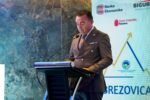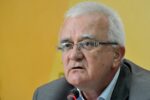Acting Prime Minister of the Republic of Kosovo, Albin Kurti, participated in the second edition of the “Za n’Kujtesë” Forum, which this year was dedicated to the poisoning of students in Kosovo during 1990–1992. This new edition, organized by the Institute for War Crimes Research in Kosovo in cooperation with the Ministry of Education, Science, Technology and Innovation (MAShTI), presents documents, photographs, and testimonies from the period, shedding light on one of the darkest episodes of the 1990s.
In his opening speech, Prime Minister Kurti expressed that he was pleased that six months after the first forum, which focused on Albanian soldiers killed in the Yugoslav army, the second forum now addresses the poisoning of students in the early 1990s.
“Among all the crimes committed by the occupying Serbian state against Albanians in Kosovo, one of the most macabre and evil was precisely the poisoning of students. Many of us here experienced that dark time, which remains vivid in my memory, as I was a first-year student at the ‘Xhevdet Doda’ High School in Pristina when, in the spring of 1990, it became clear that students were being poisoned in schools,” said Prime Minister Kurti.
He recalled that the poisoning incidents began on March 21, 1989, in Klina and on December 6, 1989, in Prizren, noting that just two days before the suppression of Kosovo’s autonomy on March 23, 1989, the first cases of poisoning occurred at the “Luigj Gurakuqi” school in Klina. In the following months, beginning March 15, 1990, cases were reported in 20 cities and 11 villages across Kosovo. Beyond students in schools, poisoning incidents were also recorded among workers in the “Emin Duraku” textile factory in Gjakova, the “Balkan” factory in Suhareka, the “Polet” factory in Vushtrri, and sporadically among passersby. Even seven children at the “Emin Duraku” daycare in Gjakova were reportedly poisoned. On March 19, 1990, massive student poisonings occurred in Podujeva, followed by another wave on March 22. March 20, 1990, marked the peak of the poisonings, with reports from multiple cities across Kosovo. The highest number of victims was recorded in the Ferizaj municipality, with the total number of poisoned students estimated at 7,421.
“Serbian authorities tried to cover up these poisonings, obstructing investigations and medical analyses. They also persecuted those who tried to provide aid, such as 48 students from the Faculty of Medicine who were imprisoned for, as it was stated, unauthorized provision of medical assistance. Despite these efforts, these state crimes by Serbia have undoubtedly left behind substantial evidence,” stated the Prime Minister.
In addition to victims’ testimonies, witness statements, various medical and international organization reports, as well as accounts from politicians of the time, Prime Minister Kurti highlighted the importance of documenting crimes committed by Serbia in Kosovo through Kosovo’s state institutions. To this end, the Institute for War Crimes Research in Kosovo was established, creating an archival, library, and audiovisual center to serve researchers, journalists, lawyers, and policymakers seeking the truth about Kosovo’s history and relevant policies.
“By collecting evidence of the poisonings and all crimes committed by the Serbian state in Kosovo, and by safeguarding memory through our institutions and as a society, we ensure that fascism does not return and that the past does not repeat itself,” concluded Kurti.







